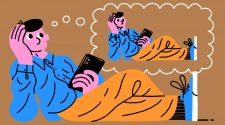Stress is an automatic and natural response of the body to challenging situations; positive, negative or imaginary changes are capable of triggering it. It is necessary to have stimuli and to act before daily life, explained Argentina Robledo Domínguez, psychologist of the General Directorate of Health Care of the UNAM.
It is an evil of our time, but if it is moderate it is positive and useful to get out of bed and carry out daily activities, and when it becomes chronic it can cause emotional disorders and gastrointestinal and cardiovascular diseases.
It is usually triggered by separations, losses, changes (from work, home or school), events that occur unexpectedly, public speaking, vehicular traffic, a trip, excessive activities and uncertainty.
“A lot of stress equals tiredness, anxiety and illness; little is equivalent to boredom, apathy and frustration, but when it is optimal, with balance and moderation it is equal to creativity, satisfaction and success ”, he said in the conference“ Strategies against stress ”, within the Cycle of Health Promotion and Self-care from the Faculty of Engineering (FI).
Chronic stress symptoms
Regarding the physical signs or symptoms of chronic stress, Robledo highlighted muscle tension, especially in the neck and shoulders; headache localized to the nape; Stomach ache; dry mouth; tachycardia; feeling short of breath and shaking.
The symptoms can also be emotional and express themselves with irritability, impatience, nervousness, lack of concentration, negativism (perception of a gray life) and lack of interest with a decrease in the desire to carry out activities that were previously considered pleasant.
Signs can also be behavioral, such as appetite disorders, drug abuse, insomnia, anxiety with sudden bouts of "speed up", and poor interpersonal relationships.
Strategies to combat it
To manage stress, the therapist recommended practicing two types of breathing with the eyes closed: the diaphragmatic, in which the air is slowly directed towards the stomach and is kept there for a moment before blowing, and the inhalation and exhalation through the nose until you hear the passage of air. "Repeating these types of breaths five times in a row helps reduce anxiety."
He suggested getting into the habit of practicing both each day, lying on the floor, then getting up. He also advised progressive muscle relaxation, which consists of tensing each part of the body and then releasing it, as well as laughing frequently.
“It is essential to have a vision of where we are and where we want to go, and accordingly establish deadlines and actions to reach realistic goals; also, delegate responsibilities; be cordial; say no to tasks we cannot accomplish; get enough rest; exercise; define the important things in life and discard the trivial ones; not worrying about what you cannot control; sleep between 7 and 8 hours and eat a good diet ”.













No Comment